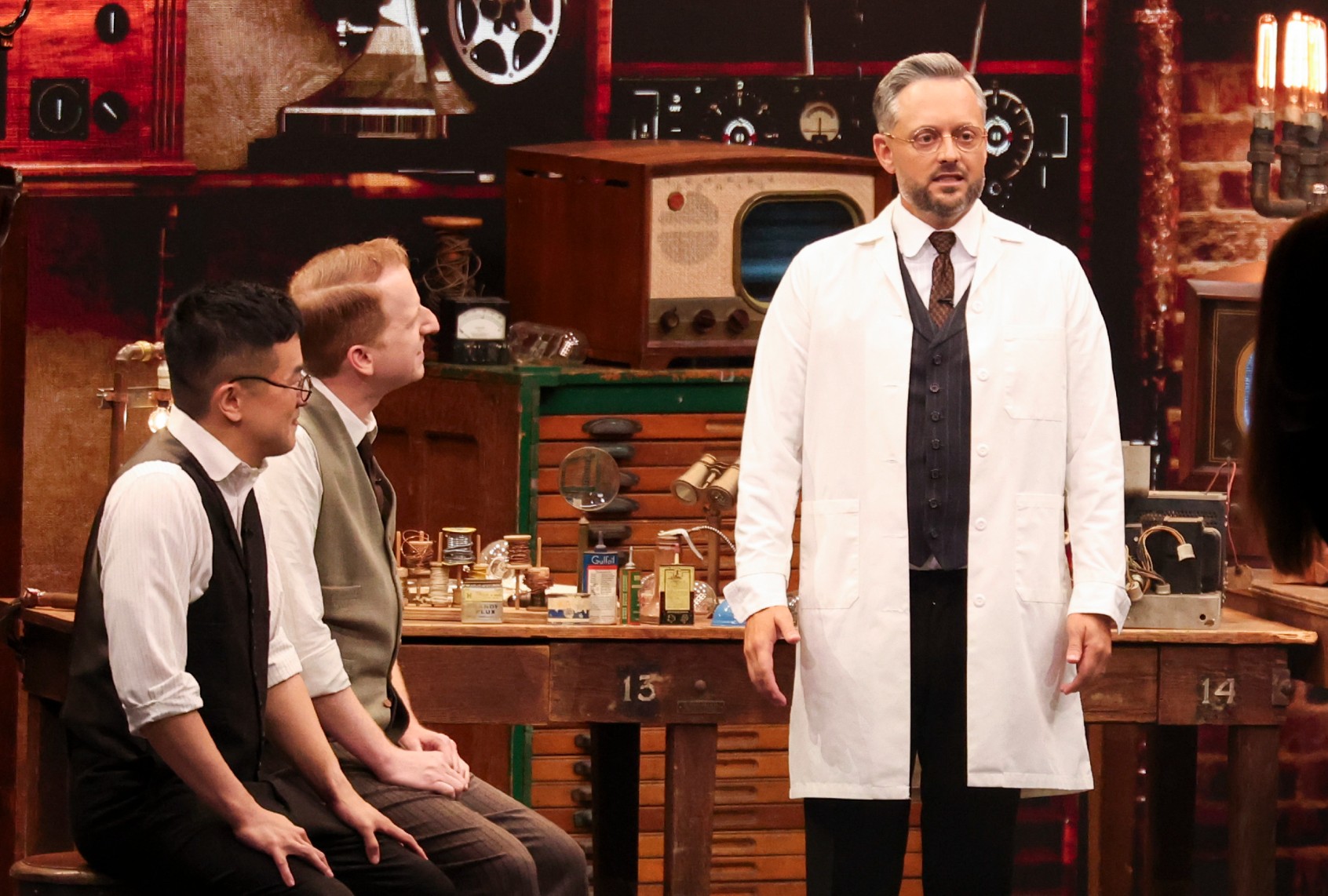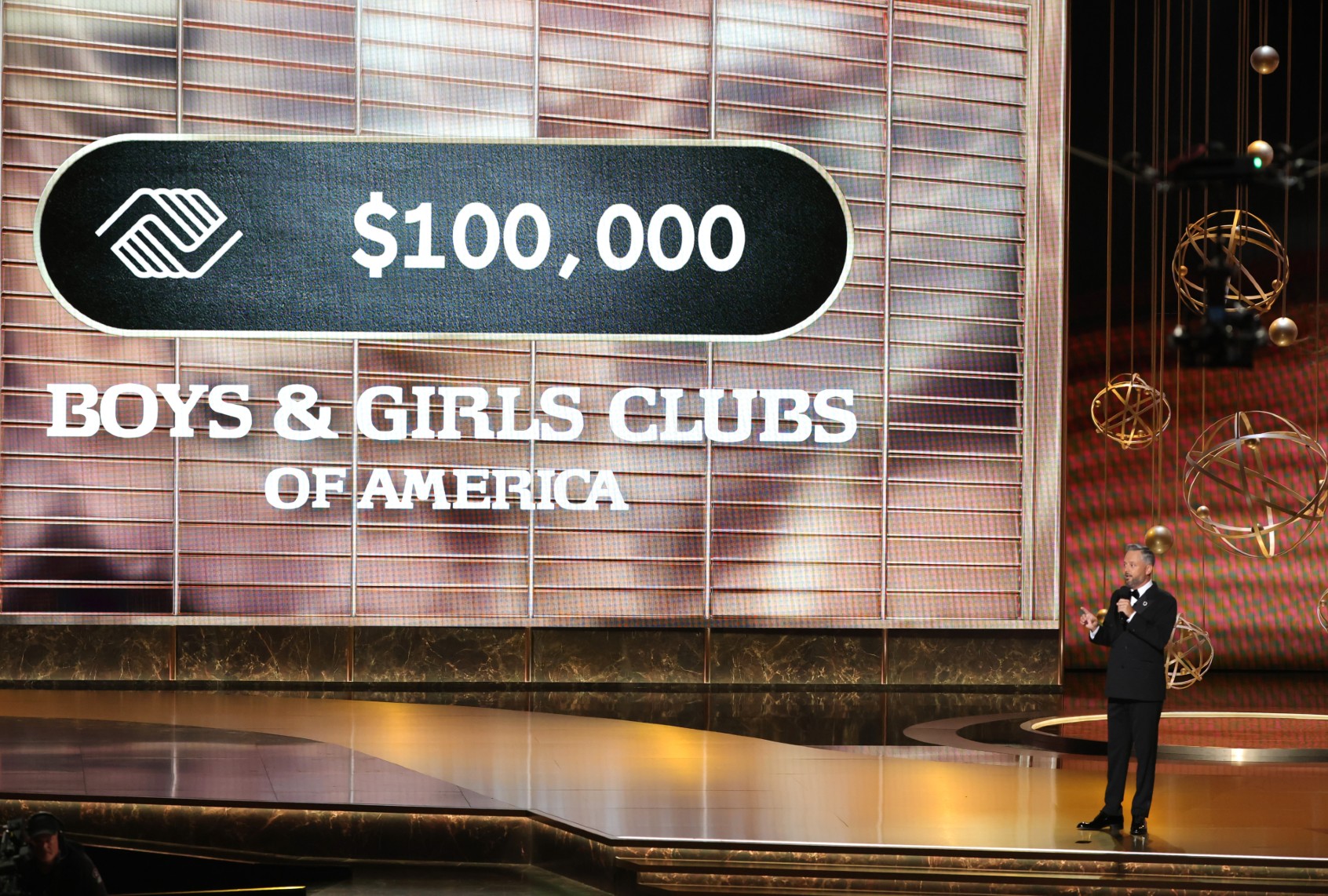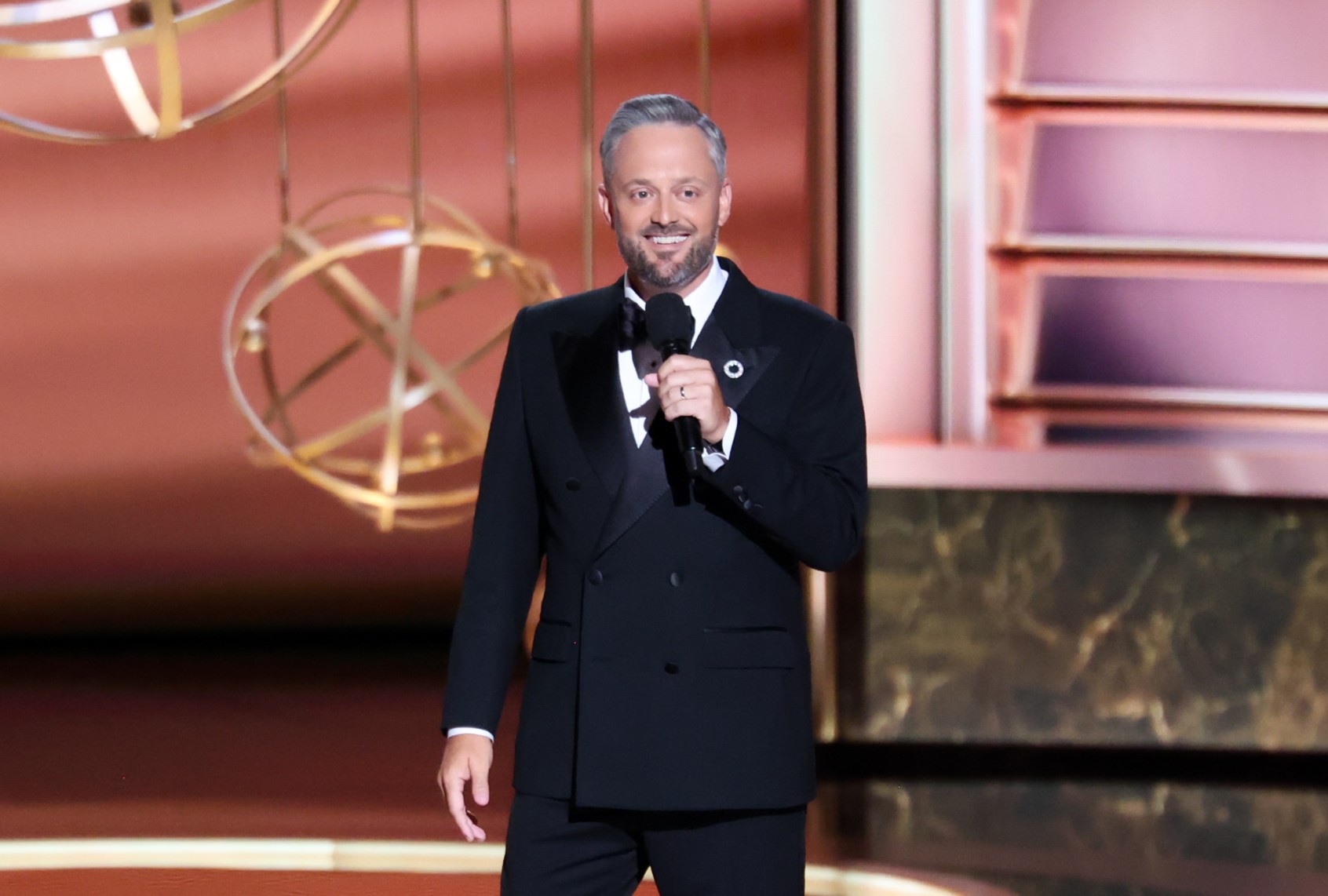“The 77th annual Emmy Awards were brilliantly hosted by Stephen Colbert.”
In a just world that made sense, the previous sentence would have been true. For a moment, when the host of “The Late Show” took the stage on Sunday, there was reason to hope it could be.
Colbert strode out directly after Nate Bargatze performed an Emmys-themed redux of a “Saturday Night Live” sketch featuring Mikey Day, Bowen Yang and James Austin Johnson, with Bargatze playing TV inventor Philo T. Farnsworth. It was . . . fine. But it didn’t inspire the thunderous standing ovation that greeted Colbert when he took the stage and joked, “While I have your attention, is anyone hiring?”
Colbert, whose “The Late Show” is coming to an end in 2026, immediately had the audience eating out of his hand, producing a headshot dating from his “Strangers with Candy” era and handing it to Harrison Ford, asking him to pass it along to Steven Spielberg. And his easy connection with the crowd made me wonder for a delicious moment if the producers might have bravely hidden a bait-and-switch. The 77th Emmys telecast arrived after a terrible, frightening week in America. Who better to guide this exercise in self-congratulation into unifying territory than Colbert?
The answer is not Nate Bargatze. Once Colbert handed out the first Emmy of the night, for lead actor in a comedy category, to Seth Rogen for his work in “The Studio,” he took his leave. Then Bargatze returned, and shortly afterward I started wishing he’d leave, too.

(Christopher Polk/Variety via Getty Images) Nate Bargatze at the 77th Primetime Emmy Awards on September 14, 2025 in Los Angeles, California.
Evaluating this Emmys solely by the winners, TV had a great night. “The Pitt” took home best drama, while Rogen’s individual win lit the fuse on a dominant night for him and “The Studio,” which scored best comedy.
As for its host, it wouldn’t be fair to call Bargatze the worst ever in a timeline where Jo Koy’s 2024 Globes debacle happened. But throughout the 2025 Emmys telecast, the nice guy comic flailed in the deep end of a flop sweat pool.
There was the instance where he referred to “Gilmore Girls” as “Gilmores Now” before Alexis Bledel and Lauren Graham commanded a warm, loving tribute to the show. There were several times when he pretended to be unfamiliar with the celebrity presenters in ways that simply weren’t cute. But those were nothing next to the most wrongheaded move in recent Emmys history: the penalizing charity counter.
The gag entailed Bargatze announcing his commitment of $100,000 to The Boys and Girls Club of America. However, to keep the winners’ speeches to 45 seconds or less, he said he would deduct $1,000 from that amount each second someone went over. So the choice was to keep their thank you speeches short or supposedly take money away from needy children.
Hopefully, nobody believed that Bargatze or CBS weren’t going to pay up at the end of all this. They did, contributing $350,000 to The Boys and Girls Club — much more than the purported $100,000. No harm done. Except for the optics of it all.
Television is an escapist medium, and Bargatze, a Red State comedian, vowed to avoid politics. But no awards show is uplifting enough to forget the cruelties our government is visiting upon children. Also, the Television Academy didn’t entirely avoid politics. Late in the telecast, its chair, Cris Abrego, led a tribute to the Corporation for Public Broadcasting, recipient of the Governors Award in the same year that Congress stripped its funding. The CPB is but one of many institutions dedicated to enriching children’s lives that are being hollowed out for no reason beyond heartless partisanship. With that on people’s minds, it’s no wonder that joking about taking money away from kids did not go over well.
If you weren’t turned off by the perception of callousness, the distraction of watching the level of charity pot dwindle while people thanked their mothers, spouses and co-workers was aggravating. On the off chance that an awards producer ends up reading this, here’s a hint: we want to hear what the winners have to say.

(Kevin Winter/Getty Images) Nate Bargatze speaks onstage during the 77th Primetime Emmy Awards on September 14, 2025 in Los Angeles, California.
We especially delight in hearing from winners like Katherine LaNasa, star of “The Pitt.” She was something of a dark horse in the best supporting drama actress category, which was loaded with the stars from “The White Lotus” and a pair of two-time Emmy winners in Patricia Arquette from “Severance” and Julianne Nicholson, for her work in “Paradise.”
Her celebration should have been the only thing to which the audience paid attention. Then the counter popped up to show the audience how much LaNasa was supposedly taking away from needy youngsters by expressing gratitude to her co-workers and husband.
The counter also marred “Hacks” star Hannah Einbinder’s acceptance for her best supporting actress win. That was memorable for another reason, since producers cut the sound so the home audience wouldn’t hear the diehard Philadelphia Eagles fan declare, “Go Birds, f**k ICE and free Palestine.”
Einbinder’s political statement was the most direct in an Emmys ceremony where very few winners had anything to say concerning the plethora of crises going on in the world, including the ideological attacks on the nation’s highest institutions dedicated to preserving art and culture. That is disheartening, but it also explains why Emmys producers chose such an aggressive strategy to curtail speeches. Winners are primed to yell over the music playing them off, but competing against a visual measure of one’s alleged selfishness had more of a chilling effect.
We need your help to stay independent
The producers did seem to read the room a little as the show wore on, showing the counter for some speeches and keeping the time overages a mystery in others. Bargatze avuncularly threatening to introduce a swear jar into the proceedings didn’t go over well either – especially with the host of “Last Week Tonight with John Oliver,” who used part of an acceptance speech for one of the show’s two Emmy wins to say, “F**k you Nate Bargatze, that is a lot of money for you, and you can add a f**k to the swear jar as well.”
Oliver’s pointed insouciance concerning the jokey charity threat is about as predictable as Jean Smart’s repeat win in the best comedy actress race and the massive haul for “The Studio.”
In addition to his acting win, Rogen scored an Emmy for best directing and shared a best writing trophy with his collaborators Evan Goldberg, Peter Huyck, Alex Gregory and Frida Perez. The Apple TV+ series also took home the top comedy Emmy.
There were folks in the audience who didn’t think that was anything to laugh at; the unmistakably sour expression on James Burrows’ face as Rogen skipped to the stage was life-giving. (If you were a TV Hall of Famer who won Emmys for “Taxi,” “Cheers,” and “Will & Grace,” you might feel a certain way about the town’s favorite stoner routing the comedy landscape, too.)
Bargatze’s standup style is pleasant and all-welcoming, qualities that could have been assets in a moment of massive anxiety and uncertainty. But his first Emmy hosting gig revealed an insistent tone deafness that he could not steer out of, and it made a parade of worthwhile wins into a slog.
In all, “The Studio” scored 13 wins across the Primetime and Creative Arts Emmys, making it the most-awarded show of the year. It’s also the kind of series award show voters love: a satire about the inner workings of the entertainment industry that calls attention to its devaluation of genuine art and original concepts.
Balancing that out was the best drama win for “The Pitt” in a category that strongly favored “Severance,” and Noah Wyle’s best drama actor conquest in a race against Adam Scott. The workplace mind trip scored its share of hardware, including for Britt Lower’s Emmy for best drama actress and Tramell Tillman’s history-making supporting actor victory, making him the first Black actor to win in that category.
Elsewhere, 15-year-old “Adolescence” star Owen Cooper became the youngest ever male Emmy winner, period, with his triumph in the best supporting actor in a limited/anthology series or TV movie race. (The previous record holder was “That Certain Summer” star Scott Jacoby, who was 16 when he won in 1973.)
“Adolescence” dominated the limited series categories with wins for best limited or anthology series, best actor for its co-creator and star Stephen Graham, best supporting actress for Erin Doherty, and best writing.
This, too, was predicted. Flip over that coin, and you get Dan Gilroy’s writing win for “Andor,” which makes sense to anyone who watched this frighteningly prescient season. (Then again, Gilroy’s long speech prioritized praising his corporate overlords Bob Iger and Lucasfilm president Kathleen Kennedy before his cast and his wife, reducing the money pile from $92,000 to $73,000. What was “Andor” about, exactly?) Yet an Emmy win for this poignant, smart “Star Wars” story joins the realm of pleasing surprises beside LaNasa’s clinch and Jeff Hiller’s supporting comedy actor score for his beautiful work in “Somebody Somewhere.” Calling this an unexpected turn is a mild sell; Hiller’s race favored Ford, a first-time Emmy nominee.
Like that triumph, Cristin Milioti’s Emmy for best actress in a limited or anthology series or movie for her work in “The Penguin” was also sweet; that category pitted her against Cate Blanchett and Michelle Williams. Between Milioti and Hiller, though, he had the speech that best captured the joy of the underdog pawing his way to the top. “I feel like I’m going to cry because for the past 25 years I’ve been like, ‘World, I want to be an actor.’ And the world’s like, ‘Maybe computers?’” he joked.
Then Hiller summed up the magic of “Somebody Somewhere” as “a show about connecting and love in this time when compassion is seen as a weakness,” which, while not explicitly political, acknowledges the mood meeting this telecast.
Start your day with essential news from Salon.
Sign up for our free morning newsletter, Crash Course.
Bargatze’s standup style is pleasant and all-welcoming, qualities that could have been assets in a moment of massive anxiety and uncertainty. But his first Emmy hosting gig revealed an insistent tone deafness that he could not steer out of, and it made a parade of worthwhile wins into a slog.
We will never know whether Colbert would have done better – oh, please. He absolutely would have. Consider his reaction marking “The Late Show” winning the Emmy for outstanding talk series. Ten years ago, he recalled answering Spike Jonze’s question of what he wanted his show to be about by saying he wanted to do a late-night comedy show about love.
“I don’t know if I ever figured that out, but at a certain point, and you can guess what that point was, I realized that in some ways we were doing a late-night comedy show about loss,” he observed. “And that’s related to love because sometimes you only truly know how much you love something when you get a sense that you might be losing it.”
He concluded, “Ten years later, in September of 2025, my friends, I have never loved my country more desperately. God bless America. Stay strong, be brave and if the elevator tries to bring you down, go crazy and punch a higher floor!” Positive, nonpartisan and he quotes Prince. More of this in the future, please.
We may see Colbert play ringmaster for a future awards broadcast after “The Late Show” ends, if we’re lucky and he wants the job. From what we saw on Sunday, he’s exactly what people who love bold television need. Bargatze may want to take a few notes before he tries this again or, better yet, stick to touring and leave the Emmys out of it.
Read more
of Salon’s awards coverage


